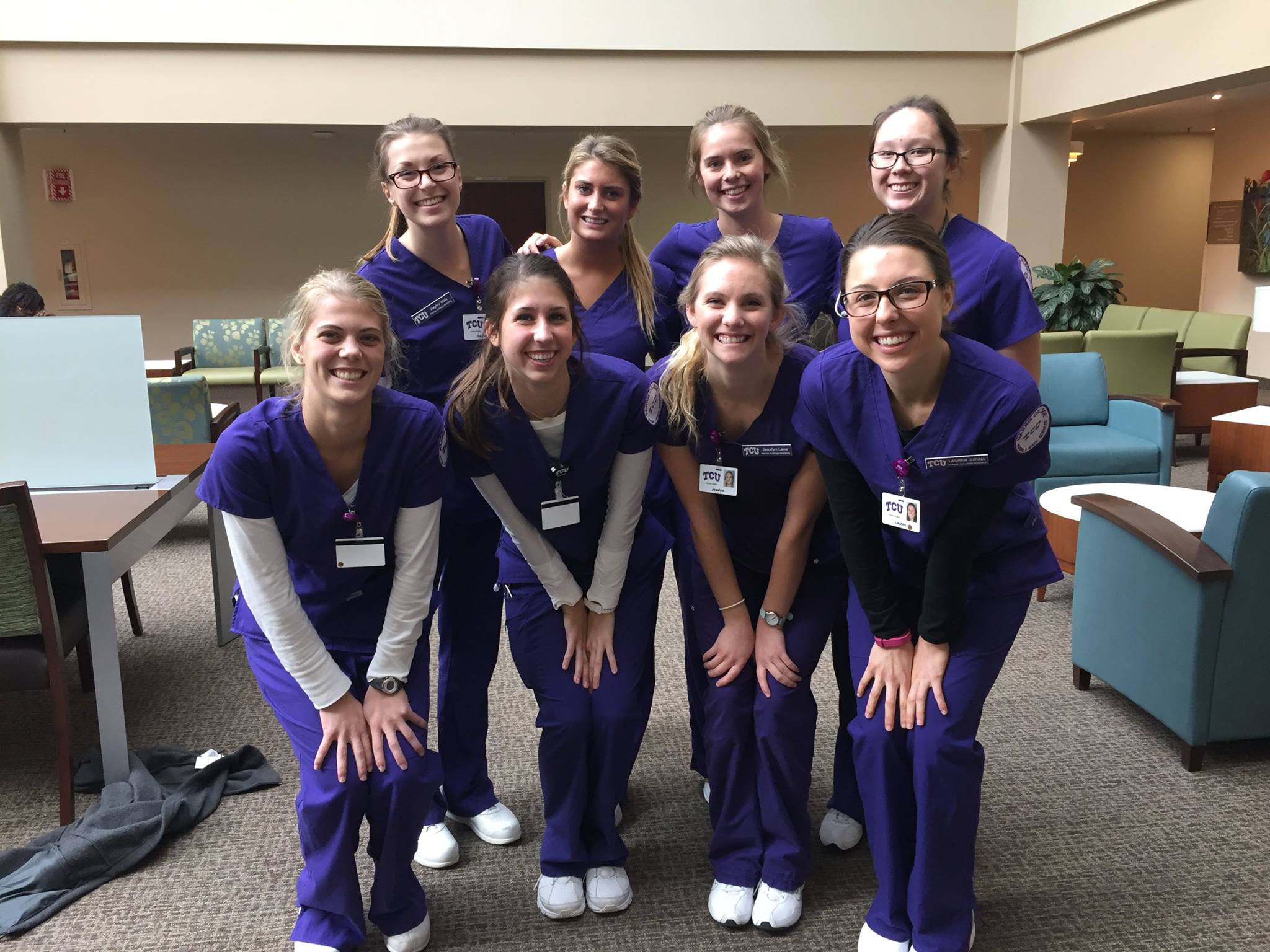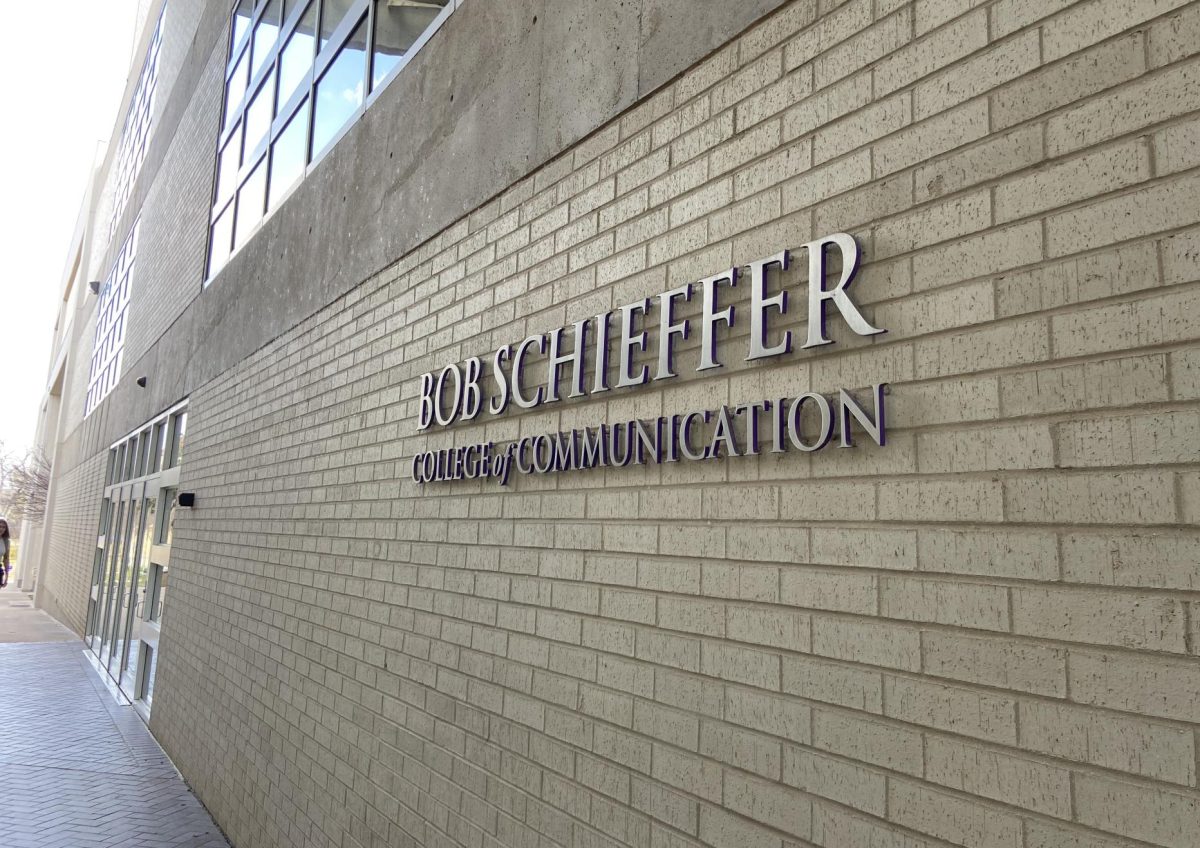Final exam season is here at TCU, where students must complete tests, projects, papers and presentations in order to conclude the semester.
The increase in schoolwork sometimes accompanies an increase in feelings of pressure — pressure on college students to perform well.
“My parents have always pushed me to get really good grades and do really well in school,” senior food management major Hanna Chait said. “They’ll call me and ask how school is going and I’ll just say that it’s fine and change the subject because I don’t know how to tell them I got a C on my testm even though I studied for it for a week.”
“Trying to please my parents is so hard,” she added.
Other students agreed that trying to please parents is one aspect of the pressures surrounding academics.
“Sixty-thousand dollars a year is a lot of money, and to not perform I feel it’s almost disrespectful to be failing a grade or something like that. It puts a lot of pressure on me to do well because I don’t want to disappoint my parents or disrespect them in any way, so I should re-pay them by doing well and being successful,” first-year business major Justin Raff said.
One student said the most pressure she experiences to do well academically is the pressure she places on herself.
“It’s just an internal drive I have, I don’t get it from my parents — they’re the ones telling me, ‘You need to relax more, you’ll get a job, you’re a good student,’” senior nursing major Jesslyn Lane said. “Sometimes I hate the pressure I put on myself and wish I could relax more. I definitely think it has helped me succeed and do well but I think sometimes I can take it to an unhealthy extent.”
American college students today experience higher amounts of stress than any time in the nation’s history — 30 percent of first-year college students in 2012 reported being frequently overwhelmed and the amount of women reporting feeling frequently overwhelmed was at 40.5 percent. When the question was initially asked in 1985, stress levels were less than half the current numbers.
Data confirms an increase in stress levels since the 1980s. One study found the average high school student in 2000 had the same anxiety levels as the average psychiatric patient did in the 1950s.
So why do college students feel pressure now more than ever before?
Surroundings matter
Leigh Richardson, founder of the Brain Performance Center and expert in the neuroscience field, said the world we now live in plays a part as a source of pressure.
“We live in such an immediate world now that expectations and people’s expectations on us and us on ourselves and us on others is much higher than it used to be,” Richardson said.
Richardson said she thinks that in general today, everybody feels more pressure to perform and do well due to environmental pressures.
“When I grew up, I never heard of anything like 9/11 or the Paris bombing, it’s a totally different world that we live in now. Trauma, I think, is a part of our daily life,” she said. “I do think the environmental pressures make us more vulnerable and I think that we’re more acknowledging and accepting of mental health, vulnerabilities, and I think that we’re more prone to look for an immediate answer.”
Clinical hypnotherapist Barbara Ross said the pressure for perfection sometimes originates in the home environment.
“I think the different genders quite often look to their parents or brothers and sisters of the same gender,” Ross said. “For instance, if a father has a perfection thing, then the son, if they’re growing up, never feels they can make the mark and it seems like an impossible task, and the same with females. A female will look at the other females in the household and the male will tend to look at the other males.”
A world where everyone seems to know what’s going on with others can contribute to already present pressures some students experience in the academic realm.
Ross said the pressure from today’s society is terrible. She said society promotes the successful person and not the mediocre, and this is problematic because not everyone can be on top.
“Everything is done on the computer and everybody exaggerates too, on Facebook, everybody is saying ‘Look at where I’m going’ or ‘Look at what I’m doing,’” Ross said. “Everything is instant gratification — with your achievements, people know very fast if someone is doing extremely well, but on the other hand, people know if you’re not doing well.”
“Twenty years ago, it was just your friends,” she added. “Now, everybody seems to know what’s going on.”

Pressure from peers can play a role in a student’s academic achievements. Lane said that the competitive environment in nursing affects her.
“Everyone is always working really hard, so it’s not that I’m super competitive with other people with grades, but it’s just the environment we put ourselves in and everyone is just always pushing each other so I think maybe it just makes it worse for me,” Lane said.

Hitting the books
Schoolwork also may have gotten harder and more demanding, thus intensifying the pressures and anxieties college students feel today.
Richard Enos, a professor in the department of English, has been teaching for 43 years. He said he taught his first graduate course as a professor in 1973 and the material he taught then is material he is teaching now for undergraduates.
“I’ve often thought, ‘If I was a student right now, it would be a load,’” Enos said. “I do think there’s more pressure and the complexities of it are clearly more evident to me.”
He attributed the way some students feel during finals and also year-round in college to an increased emphasis placed on higher education and competition in academia.
“We see a lot more schools competing with each other for the best students, we’ve ratcheted up the academics to attract those students, and students themselves on their part are realizing if they want to do well, they’ll get funding, scholarships and to get into programs,” he said. “So everybody is ramping up.”
Mauricio Papini, psychology department chair and professor, said schoolwork has become more accessible.
“Given trends in grade inflation, one would have to assume that either young people during the last 20 years or so are incredibly more intelligent than it was the case before, or teaching practices have become more accessible,” Papini said.
Evidently, the nation is surely “ramping up” — in fall 2016, 20.5 million Americans were expected to attend an American university or college, an increase of about 5.2 million since fall 2000, according to the National Center for Education Statistics (NCES).
Additionally, in the 2016-2017 school year, NCES predicts American colleges and universities will “award 1,018,000 associate’s degrees; 1.9 million bachelor’s degrees; 798,000 master’s degrees and 181,000 doctor’s degrees,” when just two years ago in 2014, the number of awards given out were much lower.

Papini said that professors sometimes feel pressure, too when it comes to students wanting to succeed in a course.
“There are also individual differences in how professors approach teaching. Some want to be popular, some want to be fair, some try to challenge their students, and others just repeat what is in the textbooks,” he said. “Different styles would experience student pressure in different ways, but a student wanting to succeed is a great pressure to have for a professor, so long as the student matches his or her drive for success with hard work and creativity.”
Academic expectations, competition and performance are increasing constantly in the U.S.
“Kids are expected to be high achievers in everything, expectations are so high; therefore, the pressure is high,” Ross said. “I also think that because school children, say, from middle school onwards, start having so much homework and they don’t go out like they did 20 years ago and 30 years ago and just run around and play sports and play in the streets — and that’s a great stress reliever — and so now it’s all about computer work, achieving and getting the gold academically.”
Test anxiety
The pressure to perform academically may lead to test anxiety in some individuals, a psychological condition where one feels extreme distress and anxiety in testing situations.
Test anxiety may stem from an adrenaline rush, a student’s expectations, past poor testing experiences and/or a lack of preparation.
“Ever since I could remember, I have been horrible at taking tests, they terrify me,” Christopher Pozzi said, a senior communication studies major. “The worst part about them is that I feel like I know a large portion of all the information that I am usually tested on; however, the idea of forgetting all the information almost makes me more nervous when I’m about to take the test and can’t think when actually sitting for the test.”
Pozzi is not alone.
The American Test Anxiety Association reported about 16 to 20 percent of students have high test anxiety — “the most prevalent scholastic impairment of our schools today.” Additionally, 18 percent of students have moderately-high test anxiety.
Test anxious students usually also have poorer study and test-taking skills than students who do not report having test anxiety, for they tend to score half a grade below their low anxiety peers.
Chait said she becomes very anxious when taking an exam in class. She said she has tried different studying and memorization techniques, as well as tutors, and that none of it seems to help her.
“When I get into an exam I’ll freeze up and I just stare at a wall for 20 minutes because I don’t know an answer and I run out of time on my test,” she said. “I’ll sit in class, I’ll take notes and know all the information and can recite it and apply it, but then I go into my test and I can’t do anything because I don’t know the answers — even though I do — but I psych myself out a lot and I always end up not doing well.”
Pozzi said his test anxiety comes from a combination of the work load in college and also from a “place of nervousness.”
“I had it a bit when [growing up], but ever since the stakes got higher and the material got more complicated, I get more nervous when going into a test,” he said. “I feel like the anxiety comes from a place of nervousness that I will not do well and disappoint those that are investing in me, like my parents and professors.”
Lane experiences test anxiety more so before the actual test occurs rather than when taking it.
“If I have a test the next morning, I’ll usually not go to bed until maybe 2 or 3, then I’ll get up again at 5:30 and study the last few hours before because I get super anxious and can’t really sleep, so the only thing I can do to help myself feel better is to study more,” Lane said. “When it comes to actually sitting and taking a test I’m usually okay — I don’t freeze up — but it’s kind of just like the days and last hours leading up, I’ll drink a ton of coffee and can get really stressed out and can feel my heart race.”
With test anxiety, there is usually some fear involved which manifests itself physically.
Richardson said there is a correlation between how the student feels physically and what is occurring in the brain at that moment.
“Some people, anytime they hear the word test, their hands will start shaking or sweating, or they’ll get dizzy — all of those are physiological responses to what’s going on on a neurological level,” Richardson said. “Everything you do or don’t do is driven by what’s going on in the brain or not going on in the brain and that’s where it starts. So if we just calm the brain down, then they can go in and take the test and they can perform well.”
Enos said that part of the reason students are so anxious during final exams is because they’re given at the end of a semester when “the tank is empty.”
“They’re exhausted — let’s say a semester is 16 weeks, and let’s say the midterm is eight weeks, but in terms of energy expended, most students spend as much energy in the last four to five weeks as the first 11 or 12,” Enos said. “So when they get to the last part of the last part it would be like me asking you to run a mile as fast as you can and as soon as you finish me say ‘Okay, now go run a 200-meter.’”
Test anxiety: Is there a cure?
While test anxiety may be difficult for some college students, there are ways to cope, somewhat reduce the stress and possibly rid of it entirely.
Sometimes the student needs to simply relax.
“Sometimes studying is getting away from the studying — go for a walk, watch a movie, play with your dog, get away from it for a while,” Enos said. “I tell students ‘You should not think about me for a while, go realize there’s this whole other life out there.’”
The TCU English professor tells his students to go into his office and talk with him if they’re feeling stressed or need a boost of confidence regarding their performance.
“Sometimes it’s just a reassurance thing, sometimes students just need to hear the professor say ‘You’re doing a good job,’” he said.
Using apps can be helpful to reduce test anxiety, too. Richardson said Head Space is a mindfulness app that can help students get into a meditated state.
“There’s a guy at Harvard that does a lot of research on mindfulness and he says 47 percent of us are either lost in the past or worried about the future, and staying present, staying in the moment can be very, very hard, so I think doing things like that app, doing some yoga and getting in touch with their spiritual side can be helpful,” Richardson said.

Ross said test anxiety can be treated immediately and that it’s important that one who experiences it takes control of it in order to relax. It’s her job as a hypnotherapist to find what has triggered the anxiety.
“When you finish your work, close your book and you can go have a good night’s sleep, you don’t need to wake up in the middle of night — be confident of the work you’ve always done,” Ross said. “When you’re calm and know you will reach that goal, you just need to follow through and you can do it if you’re calm and focused.”
TCU Student Government Association’s Director of Wellness – Mental Health Madelon Allen said it’s important students are taking care of themselves, especially during final exams.
“If a student is exhausted, physically or emotionally, it’ll be more difficult for them to handle the stress and anxiety of finals,” Allen said. “Try to get enough sleep and eat healthy snacks. Another big one that I know helps me is maintaining a positive attitude.
“Don’t let your self-worth be dependent on your grades, set reasonable expectations for yourself,” she added. “There’s no benefit to negative thinking.”
During final exams week, students can take advantage of SGA’s various stress reliever events.
SGA is partnering with TCU Dining Services to offer free coffees and $1 off specialty drinks at Bistro Burnett, Union Grounds and The Press. The organization is also providing free school supplies at the Library Services desk in the library.
Kat Klein, student body vice president of operations, said the events SGA is hosting are to help with students’ concerns regarding stress and energy.
“It is our goal to help alleviate the stresses of finals by providing free energy and enjoyment for students for free and discounted prices,” Klein said.
If you are feeling anxiety and/or pressure and are seeking help, call the Crisis Call Center, open 24/7 at 1-800-273-8255 and/or TCU’s Counseling and Mental Health Center at 817-257-7863.
For more information on test anxiety, visit here.








